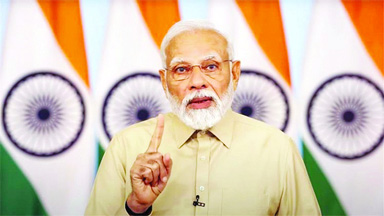New Delhi (TIP)- Prime Minister Narendra Modi on Friday, August 18, called on G20 nations to facilitate “equitable availability” of technology and “open innovations”, saying the global community must be ready to prevent and respond to the next health emergency.
Calling resilience one of the biggest lessons learnt during the Covid-19 pandemic, the Prime Minister said the period underscored the need for health to be at the center of decisions and demonstrated the value of international cooperation, “whether in medicine and vaccine deliveries or in bringing people back home”.
Modi was addressing the G20 Health Ministers’ meeting in Gandhinagar via video conferencing when he made the remarks.
“Global initiatives on global health will bring together various digital health initiatives on a common platform. Let’s open our innovations for public good. Let us avoid duplication of funding. Let us facilitate equitable availability of technology,” he said.
Stressing on the role of digital solutions and innovations in making healthcare accessible, the Prime Minister said they are a useful means to make efforts equitable and inclusive, allowing patients from far and wide to receive quality care through tele-medicine.
“Let us facilitate equitable availability of technology. This initiative will allow countries in the Global South to close the gap in healthcare delivery. It will take us one step closer to our goal of achieving universal health coverage (UHC),” he said. Modi said the Covid-19 pandemic taught the world that health issues in one part of the globe can affect every other part in a short period of time. “We must be ready to prevent, prepare, and respond to the next health emergency. This is especially important in today’s interconnected world. As we saw during the pandemic, health issues in one part of the world can affect all other parts of the world in a very short time,” he said.
Under the Vaccine Maitri initiative during the pandemic, the PM added, India delivered 300 million vaccine doses to more than 100 countries, including many in the Global South.
“In India, we are following a holistic and inclusive approach. We are expanding health infrastructure, promoting traditional systems of medicine, and providing affordable healthcare to all. We believe that holistic health and wellness can help enhance everyone’s resilience,” he said, as he highlighted the establishment of WHO Global Centre for Traditional Medicine at Jamnagar. The Prime Minister also said that India will eradicate tuberculosis (TB) well before the global deadline of 2030. “We have called upon the people of the country to be Ni-kshay Mitra or Friends for Eradication of TB. Under this, nearly one million patients have been adopted by citizens. Now, we are on our way to achieving TB elimination well ahead of the global target,” he said.
Highlighting the importance of public participation as a key factor in the success of health initiatives, Modi said it was one of the main reasons for the success of India’s leprosy eradication campaign. The country’s ambitious programme on TB elimination also encourages public participation, he added.
Must be ready for next health emergency: PM to G20 nations
